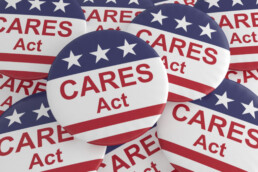Federal Government Clarifies CARES Act Eligibility

As the country continues to struggle with the challenges due to COVID-19, labor laws have been adapting to the pandemic, and employees must be aware of their rights. One area that has been significantly impacted by COVID-19 is the laws regarding unemployment benefits. The federal and state laws that govern unemployment benefits have always been complicated, and are especially difficult to understand now with the Coronavirus Aid, Relief, and Economic Security Act (CARES) that was enacted in March 2020. CARES expanded weekly unemployment benefits by as much as $600 a week to eligible workers and have proven to be vital to many families during the pandemic. While there have been a myriad of issues and concerns regarding CARES, there is no denying that to many unemployed workers relied on the additional funds as the nation’s unemployment rate sky-rocketed. Moreover, many states were overwhelmed with the volume of applications, and benefits were delayed.
While it is uncertain whether the CARES Act will be extended, the federal government provided some clarification on July 22, 2020. For example, a worker may refuse to accept a job offer because the job is unsafe and continue to collect the additional financial benefits provided under CARES. The states, however, will determine what is considered to be safe work conditions, and if a state determines the job or work conditions are not “suitable,” then the worker may receive the expanded unemployment benefits under CARES. Most states already had suitable work place provisions in place prior to COVID-19, and the general criteria is whether the work unreasonably exposes the worker to unsuitable safety risks. Labor laws have always guaranteed a safe work environment, which is particularly important during a pandemic. Notably, a worker cannot refuse a job offer and seek expanded unemployment benefits due to a general fear of COVID-19.
According to the U.S. Department of Labor, the state may also determine that a job is unsuitable if a worker refuses the job due to virus-related reasons such as increased risk of COVID-19 due to an underlying medical condition. The state may also determine a job is unsuitable if a worker claims “good cause,” although the federal government has not specifically defined what is considered to be “good cause” which means that states must decide that issue. Fortunately, workers in California benefit from some of the country’s strongest state labor law protections, and this is one example of how an experienced labor law attorney will be able to argue your case by understanding state laws to protect your rights when federal law is not clear.
The federal government also clarified that some out-of-work employees are not eligible for CARES benefits depending on what caused the loss of the job. For example, if a worker is unemployed due to a reason not related to COVID-19, that worker is not eligible for expanded benefits even if jobs are not available due to COVID-19 related circumstances. The reason for this is because CARES was enacted to assist workers who faced unemployment specifically due to the pandemic, and is not broad enough to include workers who did not lose their jobs due to reasons unrelated to COVID-19. Fortunately, those workers may still be eligible for regular unemployment benefits.
Prior to COVID-19, workers who quit their jobs without “good cause” were generally not eligible for unemployment benefits. However, under the CARES Act, certain reasons related to COVID-19 would allow a worker to qualify for expanded unemployment benefits under CARES. For example, a worker who quits a job because of mandatory quarantine, or the need to provide care to a family member with COVID-19 could be considered “good cause” for the purposes of CARES benefits.
While the federal government continues to debate whether to extend benefits under the CARES Act or perhaps craft new legislation, the states may decide to adopt new policies regarding eligibility in the meantime. However, since unemployment benefits are a hybrid of federal and state law, the states must adhere to federal law and provide at least the minimum benefits afforded under federal laws. Also, as more states work towards re-opening and more businesses are hiring, states may become stricter in determining eligibility for unemployment benefits. As we have learned, during a pandemic, it is important to be informed and be ready to take full advantage of any benefits you are eligible for. Plan ahead and consult an experienced labor law attorney so you will have an advocate that will not only understand the quickly changing laws and benefits, but will be able to guide you and protect your rights during these uncertain times.
FREE CONSULTATION
Srourian Law Firm, with locations in Los Angeles, Westwood, Woodland Hills, and Orange County is experienced in all aspects of employment law including unemployment benefits and have aggressively represented employees in Los Angeles, Hollywood, Santa Monica, Orange, Irvine, Anaheim, Santa Ana, Newport Beach, Costa Mesa, Fullerton, Tustin, Mission Viejo, San Clemente, Garden Grove, Laguna Niguel, Brea, Fountain Valley, Aliso Viejo, Yorba Linda, Westminster, Laguna Hills, Cypress, and La Habra.
If you or someone you know suffered employment violations involving unemployment benefits, you may have certain employee rights under state and federal law, and may be entitled to compensation as a part of the class action lawsuit. Please contact us to speak with one of our lawyers for a free consultation.

